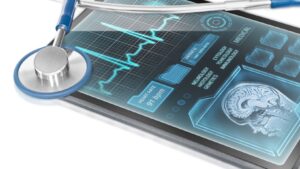In the dynamic world of healthcare, technology is a driving force that’s continually reshaping the industry. From telemedicine to AI-assisted diagnostics, cutting-edge trends are revolutionizing the way we approach patient care. This article dives into these transformative trends, shedding light on how they’re enhancing the healthcare landscape.
Join us as we delve into the technological breakthroughs that are setting the pace for a new era in healthcare. Stay tuned for an insightful journey through the most significant technology trends in the healthcare industry.
Overview of Technology Trends in Healthcare
Healthcare, like any other sector, is constantly impacted by evolving technology trends. These technology trends in healthcare present numerous advantages in enhancing patient care and service efficiency. The evolution of technology in healthcare has been progressive and driven by a commitment to improve patient outcomes. This journey began with the digitalization of patient records and has now expanded to sophisticated AI-powered solutions.

In the current phase of technological evolution, AI and machine learning are at the forefront. Robots are assisting in surgeries, AI algorithms are detecting diseases from imaging data, and predictive analytics are helping prevent diseases. With each passing year, technology trends in healthcare continue to evolve, reshape, and bring transformative changes to how healthcare is delivered and received, promising a future of enhanced patient satisfaction, increased efficiency, and improved overall outcomes.
Technology Trends In Healthcare
AI’s influence in healthcare has seen a phenomenal increase. This technology finds a plethora of uses, from cancer detection to patient monitoring. Leveraging AI, healthcare providers can analyze patients’ health records, identify patterns, and detect diseases at an early stage, potentially preventing fatal outcomes. For instance, AI-based platforms like Tempus use machine learning to personalize cancer treatments. Remember, this is but a fraction of AI’s potential in healthcare.

The rise of Telemedicine is another notable technology trend in healthcare. Sparking the digital health revolution, it paves the way for virtual consultations. Patients can consult their caretakers from the comfort of their homes, a convenience amplified during crisis circumstances like the recent COVID-19 pandemic. Telemedicine not only breaks geographical barriers but also reduces hospital readmissions and controls infection spread.
Impact of Technology Trends on Healthcare Professionals
Technological advancements have invariably impacted the responsibilities of doctors and nurses. Delivery of patient care has transitioned from a manual process to a technology-driven approach, which includes uses of AI in disease detection. With AI’s capability of analyzing large volumes of data, detecting anomalies, and making predictive analyses, diagnoses are done swiftly and treatment plans customized accurately.
On the nursing front, smart machines and software taking over routine tasks like vital sign monitoring have allowed them to focus more on complex duties. Clinical decision support tools, like Isabel and DXplain, help nurses make educated decisions, minimizing errors in patient care.
The Future of Healthcare: Predicted Trends
Delve into an exciting examination of the potential influence of evolving technology trends in healthcare. Gaze into the crystal ball if you will, and discover how these progressive shifts could reshape the industry.
Predicted Impacts of Robotics in Healthcare
In the future, healthcare may experience a robotic revolution. Automation and robotic assistance are poised to bring significant changes. They’ll improve surgical precision and patient recovery times due to their ability to perform delicate procedures with more accuracy than ever before.

Moreover, the healthcare robotics market is forecasted grow at a compound annual growth rate (CAGR) of 23.0% from 2021 to 2028. The key growth drivers include the need to enhance the quality of patient care, influence of AI on the accuracy of surgical procedures, and the need to reduce costs and human errors.
| Data | Description |
| Growth | 23.0% (CAGR) 2021-2028 |
| Key Drivers | Quality enhancements, AI-led accuracy, cost & error reductions |
Changes in doctor-patient interactions and the complexities in gaining informed consent pose additional hurdles. There’s an urgent need for robust regulatory frameworks to address these issues. The healthcare industry, governments, and society must come together to navigate these challenges and responsibly unlock technology’s full potential in healthcare.


